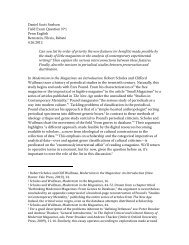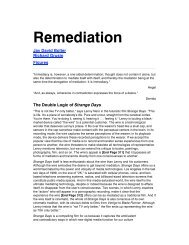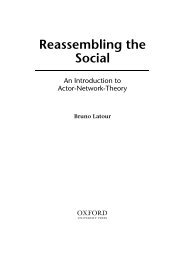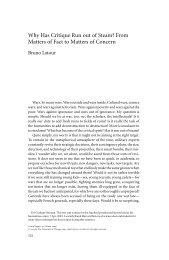The Exploit: A Theory of Networks - asounder
The Exploit: A Theory of Networks - asounder
The Exploit: A Theory of Networks - asounder
Create successful ePaper yourself
Turn your PDF publications into a flip-book with our unique Google optimized e-Paper software.
40 Nodes<br />
individual” from the modern era. Instead “individuals become ‘dividuals,’<br />
and masses become samples, data, markets, or ‘banks.’” 13<br />
What follows from this is that control in networks operates less<br />
through the exception <strong>of</strong> individuals, groups, or institutions and more<br />
through the exceptional quality <strong>of</strong> networks or <strong>of</strong> their topologies.<br />
What matters, then, is less the character <strong>of</strong> the individual nodes than<br />
the topological space within which and through which they operate<br />
as nodes. To be a node is not solely a causal affair; it is not to “do” this<br />
or “do” that. To be a node is to exist inseparably from a set <strong>of</strong> possibilities<br />
and parameters—to function within a topology <strong>of</strong> control.<br />
Not all topologies are equal; some are quite exceptional, existing<br />
for short periods <strong>of</strong> time (e.g., a highly centralized organization may<br />
briefly become decentralized to move its operations or internally restructure).<br />
But every network has its own exceptional topology, the<br />
mode <strong>of</strong> organization that is uncommon to itself. Distributed networks,<br />
be they computer based or community based, must at some point<br />
confront the issue <strong>of</strong> “decision,” even if the decision is to become a<br />
network itself. If the network is anthropomorphized, such decision<br />
points require centralization, a single point from which the decision<br />
can be made. (Sometimes this is called “the central nervous system”<br />
or “the standards - setting community.”) <strong>The</strong> point at which sovereignty<br />
touches network control may very well lie in this notion <strong>of</strong> an<br />
exceptional network, an exceptional topology. In the case <strong>of</strong> contemporary<br />
politics, America’s networked power rises only in direct<br />
proportion to the elimination, exclusion, and prohibition <strong>of</strong> networked<br />
power in the guerrilla and terrorist movements.<br />
Perhaps we are witnessing a sovereignty that is unlike the traditional<br />
forms <strong>of</strong> sovereignty, a mode <strong>of</strong> sovereignty based not on exceptional events<br />
but on exceptional topologies.<br />
Without a doubt, these exceptional topologies are troubling. <strong>The</strong>y<br />
exercise sovereignty, and yet there is no one at the helm making each<br />
decision. One might call these societies “misanthropic” or “anti -<br />
anthropological.” <strong>The</strong> societies <strong>of</strong> control have an uncanny ability to<br />
elevate nonorganic life, placing it on par with organic life. And yet<br />
there is a sense in which networks remain dynamic, always changing,









